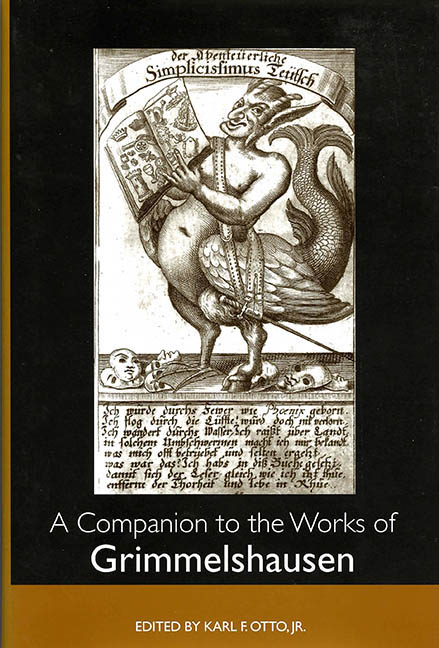Book contents
- Frontmatter
- Contents
- Illustrations
- Acknowledgments
- Chronological List of Grimmelshausen's Works and Their First English Translation
- Introduction
- I Basics
- Problems in the Editions of Grimmelshausen's Works
- Grimmelshausen's “Autobiographies” and the Art of the Novel
- Allegorical and Astrological Forms in the Works of Grimmelshausen with Special Emphasis on the Prophecy Motif
- Grimmelshausen and the Picaresque Novel
- Grimmelshausen's Ewig-währender Calender: A Labyrinth of Knowledge and Reading
- Grimmelshausen's Non-Simplician Novels
- In Grimmelshausen's Tracks: The Literary and Cultural Legacy
- II Critical Approaches
- Notes on the Contributors
- Index
Grimmelshausen's Non-Simplician Novels
from I - Basics
Published online by Cambridge University Press: 27 April 2017
- Frontmatter
- Contents
- Illustrations
- Acknowledgments
- Chronological List of Grimmelshausen's Works and Their First English Translation
- Introduction
- I Basics
- Problems in the Editions of Grimmelshausen's Works
- Grimmelshausen's “Autobiographies” and the Art of the Novel
- Allegorical and Astrological Forms in the Works of Grimmelshausen with Special Emphasis on the Prophecy Motif
- Grimmelshausen and the Picaresque Novel
- Grimmelshausen's Ewig-währender Calender: A Labyrinth of Knowledge and Reading
- Grimmelshausen's Non-Simplician Novels
- In Grimmelshausen's Tracks: The Literary and Cultural Legacy
- II Critical Approaches
- Notes on the Contributors
- Index
Summary
Grimmelshausen researchers have always made a distinction between the ten-book cycle of the Simplicissimus Teutsch and related material on the one hand, and the “non-Simplician” works on the other. There are in fact good reasons for such categorization. The novels in question, Histori vom Keuschen Joseph (1666), Musai Lebens-Lauff (1670), Dietwalt und Amelinde (1670) and Proximus und Lympida (1672), are quite different when compared to Simplicissimus Teutsch (1668–69). Still, they show some common features that indicate it may be sensible to group the first four mentioned novels together.
However, as much as it has been accepted that they are not Simplician, a common definition and denomination has been lacking. They have been labeled “galant,” “höfisch,” “höfisch-historisch,” and, faute de mieux, “non-Simplician.” Grimmelshausen's latest editor, Dieter Breuer, labels them “Legendenromane” und “Historische Romane” on the back of volume 2 of his edition, but does not categorize them within the text, and in his recent Grimmelshausen-Handbuch (1999) he simply calls them “Historische Romane.” Whereas such a definition seems too wide, the other favorite description “Legendenromane” clearly is too narrow and misses the mark.
The whole question, however, seems academic in view of the persistent neglect that these works have experienced. Interpreters have shunned them, and when they were made the main focus of a monograph or an article, philological ground-work was most often the topic: influences, sources, reception, but hardly much by way of analysis or interpretation. The moralistic tone together with long passages of circumstantial narrative and a pronounced religious and didactic intention did not enhance the attraction toward this group of novels which was rigidly set apart from the Simplicissimus cycle as if two different authors had been at work. This procedure aggravated the problem considerably since it obscured and eventually destroyed important linkages between all parts of Grimmelshausen's oeuvre.
The “non-Simplician” writings, and I will include two supplementary tracts, Satyrischer Pilgram (1666–1667) and Ratio Status (1670), do not form a separate group within the works of Grimmelshausen. The Keuscher Joseph and Satyrischer Pilgram precede Simplicissimus, and the other non-Simplician novels are parallel to the Simplicissimus-cycle.
- Type
- Chapter
- Information
- A Companion to the Works of Grimmelshausen , pp. 201 - 230Publisher: Boydell & BrewerPrint publication year: 2002



